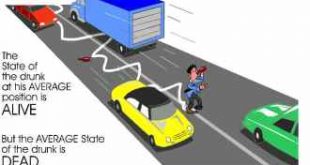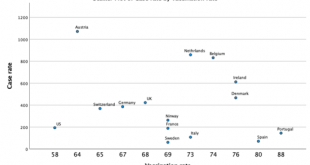Binomial test (student stuff) .[embedded content]
Read More »Regression och heterogenitet
En grupp ‘högpresterande’ elever — Ada, Beda, och Cissi — söker in till en friskola. Ada och Beda blir antagna och börjar på den. Cissi blir också antagen, men väljer att gå på en kommunal skola. En annan grupp ‘lågpresterande’ elever — bestående av Dora och Eva — söker och blir både antagna till en friskola, men Eva väljer att gå på en kommunal skola. Om vi nu tittar på hur de presterar på ett kunskapsprov får vi följande resulatat: Ada — 22, Beda — 20, Cissi — 22, Dora — 12,...
Read More »Anti-vaxxers and statistics
If we make a Pearson’s correlation analysis on the variables in the scatterplot above — the corona vaccination rate and the (7 day) case rate per 100 000 people (data from last week) — we get an r = -0,15. And still in the youtube video below Sahra Wagenknecht says there is “keine Zusammenhang” between vaccination rate and case rate for the countries in the plot. Maybe someone ought to teach high-profile anti-vaxxers some basic statistics … .[embedded content]...
Read More »David Freedman — the conscience of statistics
David Freedman — the conscience of statistics On the issue of the various shortcomings of statistics, regression analysis, and econometrics, no one sums it up better than David Freedman in his Statistical Models and Causal Inference: In my view, regression models are not a particularly good way of doing empirical work in the social sciences today, because the technique depends on knowledge that we do not have. Investigators who use the technique are not...
Read More »The experimentalist ‘revolution’ in economics
The experimentalist ‘revolution’ in economics What has always bothered me about the “experimentalist” school is the false sense of certainty it conveys. The basic idea is that if we have a “really good instrument” we can come up with “convincing” estimates of “causal effects” that are not “too sensitive to assumptions.” Elsewhere I have written an extensive critique of this experimentalist perspective, arguing it presents a false panacea, andthat...
Read More »The presumed advantage of the experimentalist approach
The presumed advantage of the experimentalist approach Here, I want to challenge the popular view that “natural experiments” offer a simple, robust and relatively “assumption free” way to learn interesting things about economic relationships. Indeed, I will argue that it is not possible to learn anything of interest from data without theoretical assumptions, even when one has available an “ideal instrument”. Data cannot determine interesting economic...
Read More »Science — a messy business
Science — a messy business The obvious response of course, albeit one that econometricians occupied with fitting a line to given sets of data rarely contemplate, is to add to the ‘available data.’ Specifically the aim must be to draw consequences for, and seek out observations on, actual phenomena which allow the causal factor responsible to be identified. If, for example, bird droppings is a relevant causal factor then we could expect higher yields...
Read More »Modelling dangers
With models, it is easy to lose track of three essential points: (i) results depend on assumptions, (ii) changing the assumptions in apparently innocuous ways can lead to drastic changes in conclusions, and (iii) familiarity with a model’s name is no guarantee of the model’s truth. Under the circumstances, it may be the assumptions behind the model that provide the leverage, not the data fed into the model. This is a danger with experiments, and even more so with...
Read More »How to achieve exchangeability (student stuff)
How to achieve exchangeability (student stuff) .[embedded content]
Read More »‘Nobel prize’ econometrics
.[embedded content] Great presentation, but I do think Angrist ought to have also mentioned that although ‘ideally controlled experiments’ may tell us with certainty what causes what effects, this is so only when given the right ‘closures.’ Making appropriate extrapolations from — ideal, accidental, natural or quasi — experiments to different settings, populations or target systems, is not easy. “It works there” is no evidence for “it will work here.” The causal background...
Read More » Heterodox
Heterodox







